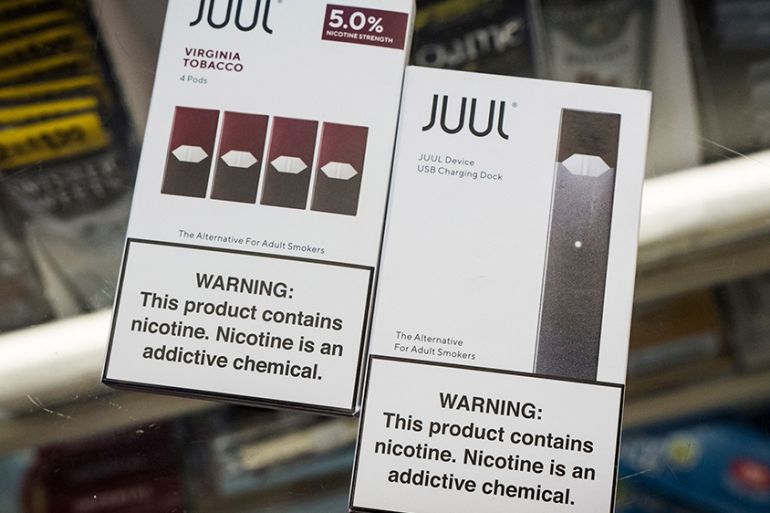E-cigarette firm Juul sued by California for targeting teenagers
Internal emails, other evidence said to show that Juul knowingly marketed and sold its products to underage customers.

The state of California in the United States has filed a lawsuit against e-cigarette maker Juul Labs Inc, alleging the San Francisco company engaged in a “systematic” and “wildly successful” campaign to attract teenagers to its nicotine devices.
The lawsuit draws on internal correspondence and other evidence, asserting the company did little to prevent sales to underage customers. It also claims that Juul used a “flawed” age-verification process for online sales.
Keep reading
list of 3 itemsSouth Korea considers banning e-cigarettes on health worries
Vaping: US deaths rise to 26, illnesses to 1,299
“Juul adopted the tobacco industry’s infamous playbook, employing advertisements that had no regard for public health and searching out vulnerable targets,” said California Attorney General Xavier Becerra, who announced the lawsuit at a news conference on Monday.
“Today we take legal action against the deceptive practices that Juul and the e-cigarette industry employ to lure our kids into their vaping web.”
Becerra alleged that Juul targeted young people in its advertising, failed to include required warnings, knowingly delivered tobacco products to consumers without verifying their age, kept the personal e-mails of minors who tried and failed to make a purchase, and proceeded to market Juul to them.
Juul spokesman Austin Finan said the company had not yet reviewed the complaint. “We remain focused on resetting the vapour category in the US and earning the trust of society by working cooperatively with attorneys-general, regulators, public health officials and other stakeholders to combat underage use and convert adult smokers from combustible cigarettes,” he said in a statement.
The lawsuit seeks monetary damages based on violations of state laws governing false advertising and unfair competition, among others.
Other lawsuits brought so far on behalf of teenage Juul users and other plaintiffs focus on the company’s early youth-oriented advertising and social media campaigns. The state of North Carolina filed a lawsuit against Juul earlier this year.
Juul, the US market leader in e-cigarettes, has come under intense scrutiny from regulators, politicians and attorneys-general over the surging popularity of its products among teenagers in recent years. More than 27 percent of US high schoolers used an e-cigarette in the previous month, according to a federal youth tobacco survey released in September, up from 11.7 percent two years ago.
A recent study found that nearly 60 percent of high schoolers and 54 percent of middle schoolers who use nicotine vaping products said Juul was their usual brand.
The company stopped selling many of its most popular flavours, including mint and mango, in the US in recent months, as research showed those flavours were highly popular among teenagers.
The lawsuit brought by California alleges that customers who failed Juul’s online age verification process could create multiple accounts to circumvent the system or ask Juul customer service employees to adjust the address or name to try again.
Sales records in California, according to the suit, show the company sent thousands of Juul devices and pods to fictitious names including “Beer Can” and “Patricia Juul,” and to addresses such as “no signature needed, Palo Alto.”
The lawsuit quotes correspondence earlier this year from a Juul senior developer, Frederic Boivin, agreeing with another employee that the company should not be allowed to edit customer information because it risked “huge compliance violations”.
Referring to a specific case, he added: “For all we know this is an underage person,” according to the suit.
Boivin went on to tell Eadon Jacobs, a director of digital product at Juul, that “you can edit everything”, according to the suit. Jacobs responded with one word: “S***,” according to the complaint.
Boivin and Jacobs did not respond to requests by Reuters for comment.